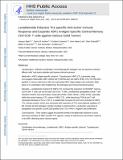| dc.contributor.author | Bae, Jooeun | en_US |
| dc.contributor.author | Keskin, Derin B | en_US |
| dc.contributor.author | Cowens, Kristen | en_US |
| dc.contributor.author | Lee, Ann-Hwee | en_US |
| dc.contributor.author | Dranoff, Glen | en_US |
| dc.contributor.author | Munshi, Nikhil C | en_US |
| dc.contributor.author | Anderson, Kenneth C | en_US |
| dc.date.accessioned | 2016-11-18T20:04:52Z | |
| dc.date.issued | 2016 | en_US |
| dc.identifier.citation | Bae, Jooeun, Derin B Keskin, Kristen Cowens, Ann-Hwee Lee, Glen Dranoff, Nikhil C Munshi, and Kenneth C Anderson. 2016. “Lenalidomide Polarizes Th1-specific Anti-tumor Immune Response and Expands XBP1 Antigen-Specific Central Memory CD3+CD8+ T cells against Various Solid Tumors.” Journal of leukemia (Los Angeles, Calif.) 3 (2): 178. doi:10.4172/2329-6917.1000178. http://dx.doi.org/10.4172/2329-6917.1000178. | en |
| dc.identifier.issn | 2329-6917 | en |
| dc.identifier.uri | http://nrs.harvard.edu/urn-3:HUL.InstRepos:29407557 | |
| dc.description.abstract | Introduction: Effective combination immunotherapeutic strategies may be required to enhance effector cells’ anti-tumor activities and improve clinical outcomes. Methods: XBP1 antigen-specific cytotoxic T lymphocytes (XBP1-CTL) generated using immunogenic heteroclitic XBP1 US184-192 (YISPWILAV) and XBP1 SP367-375 (YLFPQLISV) peptides or various solid tumor cells over-expressing XBP1 target antigen were evaluated, either alone or in combination with lenalidomide, for phenotype and immune functional activity. Results: Lenalidomide treatment of XBP1-CTL increased the proportion of CD45RO+ memory CD3+CD8+ T cells, but not the total CD3+CD8+ T cells. Lenalidomide upregulated critical T cell activation markers and costimulatory molecules (CD28, CD38, CD40L, CD69, ICOS), especially within the central memory CTL subset of XBP1-CTL, while decreasing TCRαβ and T cell checkpoint blockade (CTLA-4, PD-1). Lenalidomide increased the anti-tumor activities of XBP1-CTL memory subsets, which were associated with expression of Th1 transcriptional regulators (T-bet, Eomes) and Akt activation, thereby resulting in enhanced IFN-γ production, granzyme B upregulation and specific CD28/CD38-positive and CTLA-4/PD-1-negative cell proliferation. Conclusions: These studies suggest the potential benefit of lenalidomide treatment to boost anti-tumor activities of XBP1-specific CTL against a variety of solid tumors and enhance response to an XBP1-directing cancer vaccine regime. | en |
| dc.language.iso | en_US | en |
| dc.relation.isversionof | doi:10.4172/2329-6917.1000178 | en |
| dc.relation.hasversion | http://www.ncbi.nlm.nih.gov/pmc/articles/PMC5032910/pdf/ | en |
| dash.license | LAA | en_US |
| dc.subject | Combination immunotherapy | en |
| dc.subject | Lenalidomide | en |
| dc.subject | XBP1 | en |
| dc.subject | Antigen-specific cytotoxic T lymphocytes | en |
| dc.subject | Cancer vaccine | en |
| dc.title | Lenalidomide Polarizes Th1-specific Anti-tumor Immune Response and Expands XBP1 Antigen-Specific Central Memory CD3+CD8+ T cells against Various Solid Tumors | en |
| dc.type | Journal Article | en_US |
| dc.description.version | Version of Record | en |
| dc.relation.journal | Journal of leukemia (Los Angeles, Calif.) | en |
| dash.depositing.author | Bae, Jooeun | en_US |
| dc.date.available | 2016-11-18T20:04:52Z | |
| dc.identifier.doi | 10.4172/2329-6917.1000178 | * |
| dash.contributor.affiliated | Keskin, Derin Benerci | |
| dash.contributor.affiliated | Bae, Jooeun | |
| dash.contributor.affiliated | Munshi, Nikhil | |
| dash.contributor.affiliated | Anderson, Kenneth | |


